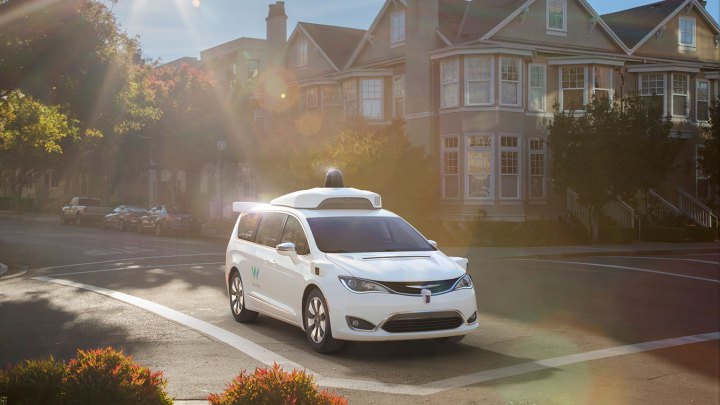
One of the most promising players in this market is the newly revamped Waymo. There has been a wave of Waymo announcements over the past few months as the company inches closer to releasing its first commercially available autonomous vehicle. Here’s everything you need to know.
What is Waymo?
For most of the past decade, Google has poured a war chest of cash into its self-driving technology. The company notoriously pioneered robotic car laws nationwide, and built a massive fleet of driverless pods that eventually roamed around Silicon Valley. Nonetheless, Alphabet, Google’s parent company, eventually decided to overhaul the entire program. In 2016, Alphabet announced that Waymo would spearhead this autonomous driving project from that point forward. Rather than building the vehicles itself, Waymo would collaborate with auto manufacturers.
This was a big first and a major pivot for the project as a whole. With the announcement, Waymo signaled a shift from further developing its pod vehicles. Investments in autonomous vehicle technologies have boomed in recent years. Major automakers like Ford and General Motors recently topped a Navigant Research study ranking the top 18 companies and their ability to develop self-driving cars. For perspective’s sake, Waymo was ranked seventh on the same list (the highest-ranked non-automaker). We elaborate more on this ravenous autonomous driving competition here.
Streamlining production
In January, at the North American Auto Show’s Automobili-D conference, Waymo CEO John Krafcik announced that Waymo built the entire sensor suite used by its self-driving Chrysler Pacifica Hybrid test vehicles. This was a huge step for the company for multiple reasons. First and foremost, this meant Waymo was no longer at the behest of multiple, third-party suppliers to create a single vehicle.
Moving the production process in-house has enabled more efficient integration of the various components (sensor hardware, sensor fusion software, image recognition). For example, when the company first started testing its self-driving cars, the cost of a single high-end lidar system was $75,000; that number has since dropped by 90 percent.
Who is Waymo working with?
Chrysler

Again, with the Waymo transition and the demise of the Google pod cars, the company made one thing very clear: It had no intention of attempting to manufacture entire cars. In 2016, Waymo partnered with Fiat Chrysler Automobiles to better commercialize its self-driving vehicle technologies. The initial deal called for the conversion of 100 Chrysler Pacifica Hybrid minivans into prototype autonomous vehicles.
To allow for the incorporation of the self-driving hardware, the minivans’ electrical systems, powertrains, and chassis were slightly modified. These prototypes have already been tested on location at Fiat Chrysler facilities in Chelsea, Michigan, Yucca, Arizona, and also at the Waymo facility in California.
Honda could be next

While the company has already partnered with Fiat Chrysler, Honda may be the next collaboration for Waymo. In December 2016, Honda announced that it was “entering into formal discussions” with Waymo to integrate the company’s autonomous tech with its cars. If this collaboration comes to fruition, we imagine it would be rather similar to the Fiat Chrysler partnership, with Honda providing a series of vehicles to be modified with the Waymo hardware.
Honda has recently been dabbling with its own self-driving car tests, so a joint venture with Waymo would be a logical next step. The company has been testing prototype autonomous vehicles based on the RLX Sport Hybrid at the GoMentum Station in San Francisco. Honda hopes to manufacture vehicles with advanced autonomous capabilities around 2020.
Public offerings
In Arizona, Waymo is already offering the general public rides in their fleet of converted Pacifica Hybrids. Waymo also announced the delivery of 500 more prototype self-driving vehicles, many of which are headed to The Copper State. As part of this trial program, Waymo will grant certain Phoenix residents round-the-clock access to its autonomous offerings, per a report by Medium.
What are Waymo’s ambitions with this project? The company hopes to use feedback from these trial riders to better understand how these vehicles hold-up in real-world scenarios, outside of the cozy confines of its test facilities. But why Arizona of all places? Chiefly because the state is one of a few areas in the country where it is legal to test autonomous vehicles on public roads. For this reason, both Uber and the General Motors self-driving vehicle subsidiary, Cruise Automation, also test their self-driving cars in Scottsdale.
Competition
As noted previously, Waymo is certainly not the only player in the burgeoning autonomous vehicle market. Ford has announced plans to launch its own self-driving vehicles for ride-sharing services by 2021. The Renault-Nissan Alliance, Daimler, and Volkswagen Group, among others, are also working to implement these technologies into commercial vehicles in the coming years.
Uber has recently deployed a a fleet of self-driving cars in San Francisco, and General Motors recently divulged plans to test a series of self-driving cars in Michigan. It is important to note that Waymo recently filed a lawsuit against Uber, claiming that a former Waymo employee stole more than 14,000 files from the company. These files were then used to create a new autonomous driving startup called Otto. This company was later acquired by Uber for $680 million.
Uber has since denied Waymo’s charges, dubbing them nothing more than “a baseless attempt to slow down a competitor.” You can read more about measures Waymo is taking to protect its secrets from Uber here.


